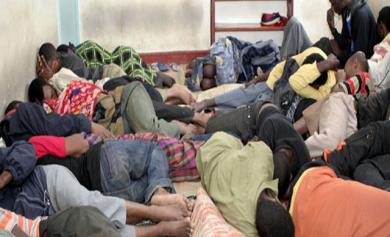
Trafficking in persons is gradually becoming the fastest growing crime in the world and the survivors who managed to make it back recount their sordid experiences. Victoria Mayaki in this report examines the pains of some of the survivors in their journey to perdition.
Human trafficking, an illegal trade in human beings for the purposes of reproductive slavery, commercial sexual exploitation and forced labour involves the movement of people from one location to another with the intention of making money out of the them and it is the fastest growing criminal industry in the world; second only to drug trafficking as the most profitable illegal industry in the world.
?
It is termed modern slavery as it is one form of sex trafficking which involves international agents and brokers who arrange travel and job placements for women from one country who are lured to accompany traffickers based on promises of lucrative opportunities unachievable in their native country.
Traffickers, also called ‘pimps’ or ‘madams’, exploit vulnerabilities and lack of opportunities, while offering promises of marriage, employment, education, and/or an overall better life. However, in the end, traffickers force the victims to come prostitutes or work in the sex industry. Various works in the sex industry includes prostitution, dancing in strip clubs, performing in pornographic films, and other forms of involuntary servitude.
?
In Nigeria, the main motive of a woman (in some cases an underage girl) to accept an offer from a trafficker is better financial opportunities for herself or her family. In many cases, traffickers initially offer ‘legitimate’ work or the promise of an opportunity to study. The main types of working offered are in catering, work in bars and clubs and modelling contracts. Traffickers sometimes use offers of marriage, threats, intimidation and kidnapping as means of obtaining victims. In most cases, the women end up in prostitution.
Janet (not real name) a victim of trafficking narrated her ordeal as horrific and something she doesn’t like remembering. “I was deceived by my mother’s cousins who came to my parents to promise them that he will help me secure admission in the university to study the course of my choice, business management. My parents agreed because they are very poor and cannot afford to send me to the university and secondly, since he was a relative, they did not suspect any foul play. I was taken to a woman in Lagos who promised to help me out but will want me to work for her in her restaurant to raise some money for my education. I worked for her as a housegirl for three years and endured all forms of hardship from her because I was like a slave” she said.
?
Another victim of the crime, Alice, who narrated how she fell victim said, “The reason why I fell victim of trafficking was as a result of poverty. I was deceived into travelling to work abroad to save money. In my village, that is the dream of most people because we envy the lifestyle of those that travel and come back to the village to show material things. So, I bought the idea of travelling to save money and come back to Nigeria to establish myself and my parents. I didn’t know it was prostitution they wanted me to go into. I was introduced to five other girls who were also deceived that they were being taken to work abroad. We were actually taken to a country I wouldn’t want to mention for prostitution. We were told we owed them a lot of money which we have to work for to re-pay them, otherwise we will be killed and our family members would not know our fate.
“We were told that if we report any of their activities to the authorities or try escaping, they will hold our family members hostage till we are caught or even kill them. We wouldn’t want any of these thingsto happen, so we were forced to comply.” She narrated.
?
Despite efforts by government to eradicate human trafficking, it still remains prevalent in the country. Head, Media and Communication, National Agency for the Prohibition of Trafficking in Persons and other related matters (NAPTIP), Mr. Arinze Orakwue said recently that poverty was the major factor of human trafficking.
“The moat common one that applies is poverty. How many people get out of school and get jobs? Lack of oversight by parents, where every parent wants to make a few more naira also results to their not being at home to look after their children as forcing to stay with the nearest neighbours.
“Another reason is the push and pull factor, push because one has economic issues like lack of jobs, lack of opportunities and the pull because of the assumption that in America, everything is beautiful,” he said.
?
Nigeria in its effort to eradicate trafficking has put up some laws to intensify its crusade against the crime. Recently, NAPTIP in line with its mandate rehabilitated and empowered survivors of trafficking with various equipments in their chosen fields of human endeavours.
The fight against human trafficking is not limited to the government or body saddled with the responsibility, but must be a concerted effort of every Nigerian as trafficking is a crime against humanity. ?

